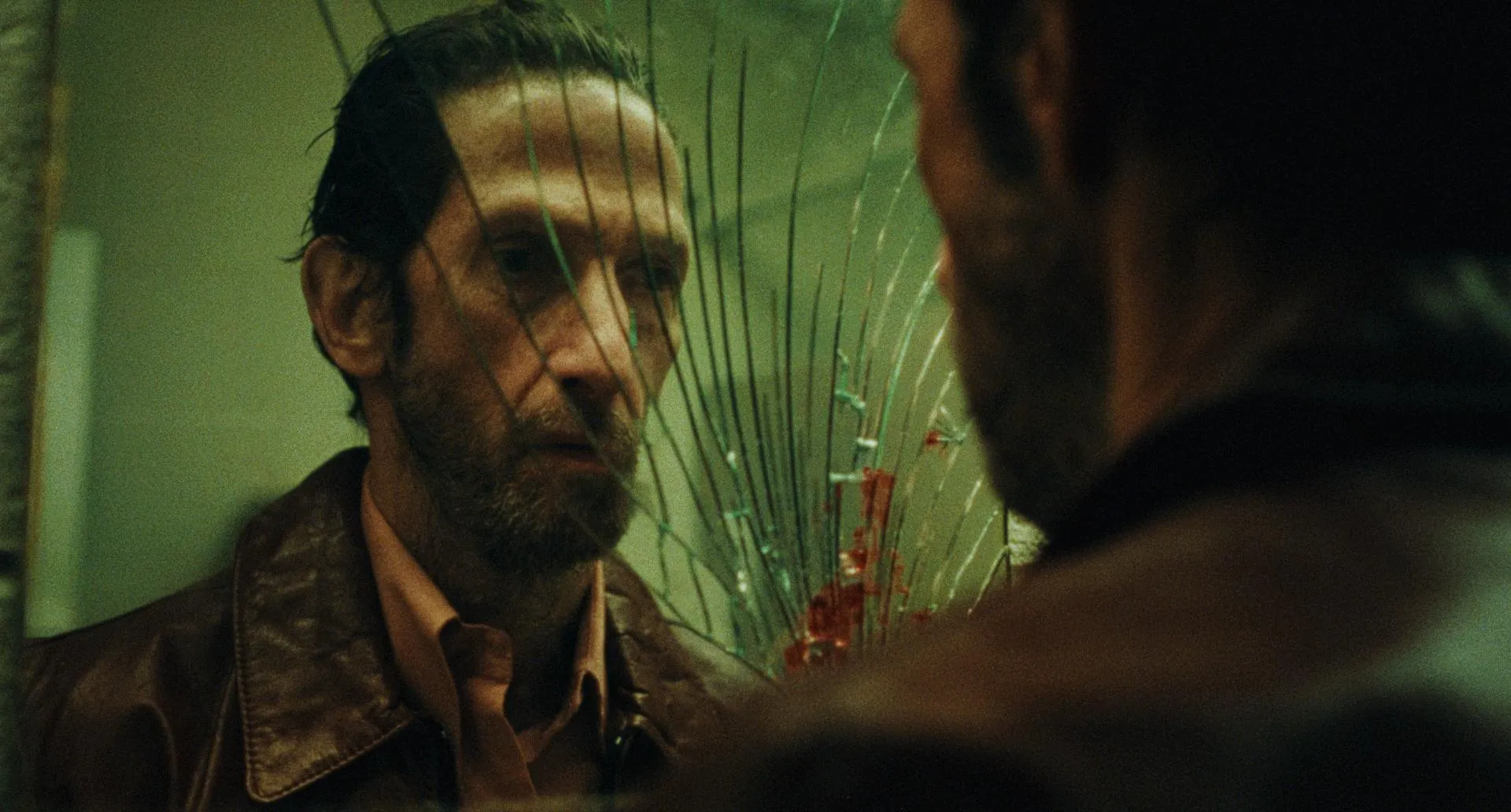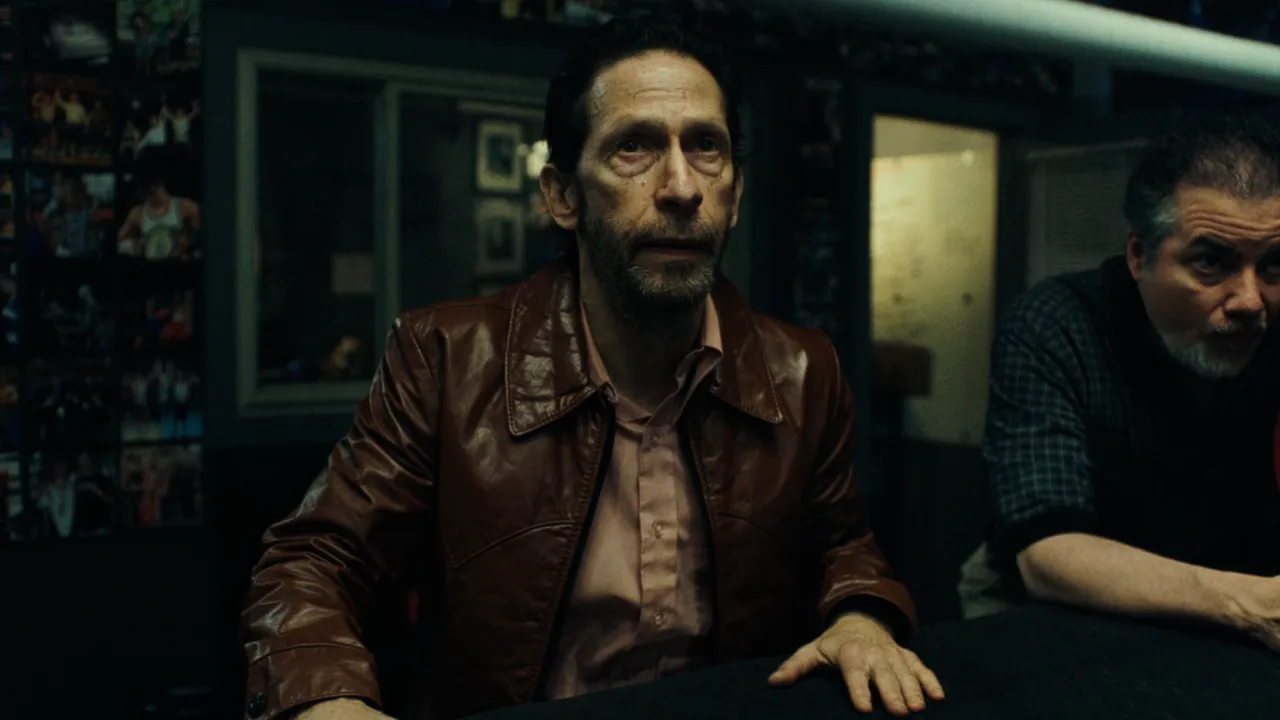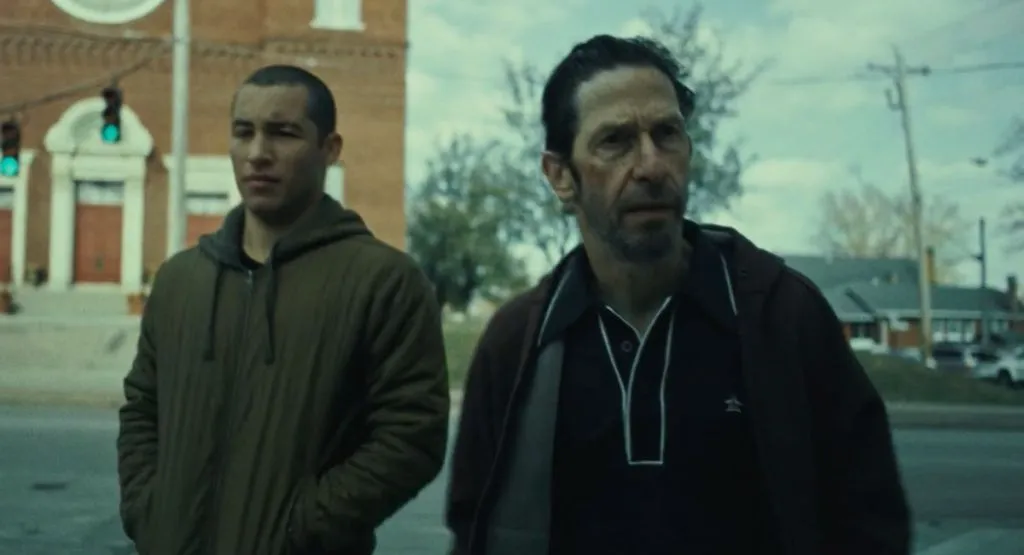Under Vincent Grashaw’s direction, Bang Bang introduces a grizzled fighter from a bygone age. Tim Blake Nelson leads us into the turbulent world of Bernard “Bang Bang” Rozyski with commanding gravity. A former hometown hero, Bang Bang now haunts the run-down streets of Detroit. His glory days are faint memories buried under bitterness.
When Bang Bang’s estranged daughter drops his troubled grandson Justin at his door, sparks of the past reignite. Bang Bang sees in Justin flickers of his own ferocious youth. He vows to train the boy, stoking dreams of reclaimed honor. Yet Bang Bang’s efforts stir haunting ghosts that demand facing. Old wounds fester, their painful truths spilling out.
Grashaw skips cliched redemption to deliver brutal, unvarnished lives. Nelson burrows into Bang Bang with gritty artistry, peeling back hardened layers. His complex, contradictory character leaps off the screen. Through their intertwined fates, Bang Bang and Justin learn boxing’s humanity extends beyond the ropes. Its pain demands we unravel our own knotted hearts and histories with hard-earned compassion.
Ringside Relations
The film introduces us to Bernard “Bang Bang” Rozyski, an ex-boxing great whose glory days are far behind him. Now living in faded splendor in Detroit, Bang Bang remains haunted by past failures. His career came to an abrupt end thanks to a controversial loss, and life has dealt few kind hands since.
Creeping into retirement, Bang Bang spends his days drinking away regrets. But life throws one last surprise—when his estranged daughter Jen shows up with Bang Bang’s troubled teenage grandson Justin in tow. With Jen needing a sitter as she starts a new job out of state, the reluctant pair are left to reluctantly bond under Bang Bang’s roof.
At first, Bang Bang sees little of himself in the meek Justin. But the retired bruiser still knows fighter bodies and thinks he spots signs of promise in the boy’s frame. Sensing a chance at redemption, Bang Bang vows to train his grandson for the ring. But is the old man’s motivation truly about Justin’s future? Or might darker ambitions be driving Bang Bang’s return to his coaching past?
As the two spar in and out of the ring, cracks emerge in Bang Bang’s tough exterior. Under the bluster lie hints of vulnerability—and hints that life has offered this proud man few moments of real pride since his defeat long ago. Though their relationship gets off to a rocky start, an unlikely kinship forms between the two unlikely partners through shared struggles.
Meanwhile, Bang Bang remains ever haunted by the man who denied him legendary status all those years ago. As ghosts of the past won’t stay buried, Bang Bang’s training becomes an avenue for settling old scores. But will dragging his family into the drama wreck what bonds they’ve managed to form?
Grappling with Grit
Behind the scenes, this film owes much to its uncompromising vision in the visuals. Director Vincent Grashaw opts for a documentary-like approach that immerses us deep in the world of Bang Bang. He finds the fighter’s story not in flashy Hollywood stylings but in cold realism.
The cinematography plays a huge part, capturing Bang Bang’s Detroit in shades of weathered gray. Through location choices like rundown gymnasiums and streets, cracks show a city past its prime, mirroring the protagonist’s own aging body. Similarly, the lighting emphasizes decay and worn surfaces over gloss. It shuns polish in favor of unwavering honesty about hard lives lived tough.
This grit gives the production authenticity that enhances every aspect of Bang Bang’s character. We see in his stiffened movements and painful limps the toll the fight game has taken. Yet through it all, Nelson ensures we also notice the spark of defiance that refuses to let this man surrender, even as his body protests each step of the way.
In crafting the visuals as they do, Grashaw and company turn what could have been cliché into a resonant portrait. Their willingness to wrestle in the mud alongside their subject makes us feel every blow along Bang Bang’s journey. It’s a commitment to uncompromising truth that makes this story and this extraordinary lead performance truly come alive.
The Fighter in the Flesh
This film belongs to Tim Blake Nelson. His role as Bernard “Bang Bang” Rozyski demands everything an actor has to offer, and Nelson delivers in spades. He sinks his teeth into the character with ferocity, bringing Bang Bang to pulsing life from intro to credits.
From the first scene, Nelson is fully Bang Bang—from his gravelly voice to the coiled energy in his limbs. Each movement, each glare, carries the hardened weight of years in the ring. But Nelson ensures we glimpse facets beyond surface harshness. His eyes shine with ghosts of better days and hints of compassion amid flaring temper.
Nelson understands this man penetrates deep. Bang Bang’s brash bravado masks wounds never healed. In quieter moments, Nelson lets us see the battered soul beneath, sharing his character’s private anguish. Even amid hostility, Nelson finds specks of hope that keep Bang Bang swinging, a testament to the actor’s empathy.
His commitment to the physicality stuns. Nelson coils his stiff frame with a boxer’s posture, replicating every flinch of battered joints. Sawdust oozes from his pores. Yet brilliance lies in subtleties like a limp fought against with gritted teeth. Nelson becomes Bang Bang, refusing to separate man from role.
Through it all, Nelson ensures we root for this prickly underdog. He compels us down Bang Bang’s heartbreaking path, facing dark truths that hit hard as blows. It’s a masterclass in acting, demanding we feel every triumph and failure as our own. In Nelson’s hands, Bang Bang lives and breathes—one that will echo in viewers’ hearts long after closing credits.
Shining in the Shadows
While this tale belongs to Nelson’s leading man, castmates give performances that heighten every scene. Andrew Liner proves a find as Bang Bang’s withdrawn grandson Justin. Where words fail, Liner lets little flickers of emotion shine through the teen’s tough shell. His natural chemistry with Nelson anchors their bond’s heart.
Nina Arianda breathes compassion into Bang Bang’s daughter Jen, hoping her father can overcome past wrongs. Arianda makes the most of limited moments, ensuring we see this caring mother’s perspective.
Kevin Corrigan is a standout as Bang Bang’s longtime friend and drinking buddy John. With just a glance or drawled word, Corrigan brings this relationship’s layers alive—their history and rough affection penetrating deeper than surface hostility implies.
Even bit roles get moments to sparkle. Daniella Pineda cuts through as Justin’s concerned teacher, Ms. Vega, letting us glimpse lives changed by this bruised community’s reality. Erica Gimpel warmly plays Sharon, the sole soul who sees Bang Bang’s humanity through gruff outer walls.
Behind every outstanding lead lies a strong ensemble, and Bang Bang boasts one. Through these supporting luminaries, the film broadens in scope and heart. They ensure this remains a story not just of one man but of an entire battered city striving to find redemption in each other’s light.
Truth in the Ropes
Woven through Bang Bang’s gripping tale are profoundly human themes that resonate long after the final bell. Family forms the cornerstone, yet Bang Bang’s relationship with his own is fractured. Tim Blake Nelson taps into the fighter’s lingering love for loved ones, mixed with issues never resolved. Through this, the film portrays redemptive power in facing painful pasts.
Bang Bang’s body also shows the brutal toll of a career in the ring. Nelson captures both the physical ravages and hidden scars that never fully heal. His commitment to reflecting every stiffened movement drives home fighting’s damage beyond visible wounds. Yet even as age catches up to him, Bang Bang retains an indomitable spirit.
This spirit is tested when Bang Bang’s training of Justin stirs ghosts from a controversial defeat. But where the old man once only saw enemies, his grandson’s bond helps Bang Bang rediscover the family’s power to soothe old hurts. Facing difficult truths about himself through this bond, he learns boxing’s humanity goes deeper than any bout result.
By the film’s end, Bang Bang embodies hard-won redemption. Overcoming bitterness through confronting painful pasts head-on, Nelson ensures we root for the fighter, reconnecting with what—and who—really matters. In mining fighting’s depths, Bang Bang ultimately discovers life’s richness lies not in any stat sheet but in embracing life’s gritty truths with open, forgiving hearts.
Ringside Revelations
From start to finish, Tim Blake Nelson owns this film with a seismic performance that demands to be witnessed. Through sheer magnetism and raw talent, he elevates Bang Bang into an unforgettable on-screen portrait that lingers long after the final bell.
But Nelson does not shine alone; he stands as the brilliant centerpiece in a story crafting a shrewd, empathetic glimpse into lives shaped by fists both outside and within the ring. With gritty authenticity, Vincent Grashaw and company ensure expends beyond typical boxing tropes into profound reflections on humanity.
What begins as a drama dwelling in cliché transforms into a deeply resonant exploration of redemption through facing darkness within. And it achieves this not through flashy artifice but grounded brushes with everyday struggles that amplify dramatic weight.
In conclusion, Bang Bang deserves recognition for its uncompromising truths that pack harder punches than any bout. But its greatest triumph lies in how it champions the indomitable spirits who rise above life’s hardest blows through perseverance, courage, and compassion. For these reasons alone, this film deserves your ringside seat.
The Review
Bang Bang
Bang Bang delivers a powerhouse lead performance at the center of a profound character study. While treading familiar genre territory, gritty authenticity and complex themes elevate the material. Nelson commands every scene with magnetic subtlety, ensuring this character—and this film—leave an indelible mark.
PROS
- Tim Blake Nelson's Tour de Force Lead Performance
- Raw, gritty authenticity of story and visuals
- Complex Exploration of Family, Redemption, and Aging
CONS
- Occasional Predictability of Boxing Film Tropes
- Supporting characters could have been developed further.




















































Discussion about this post